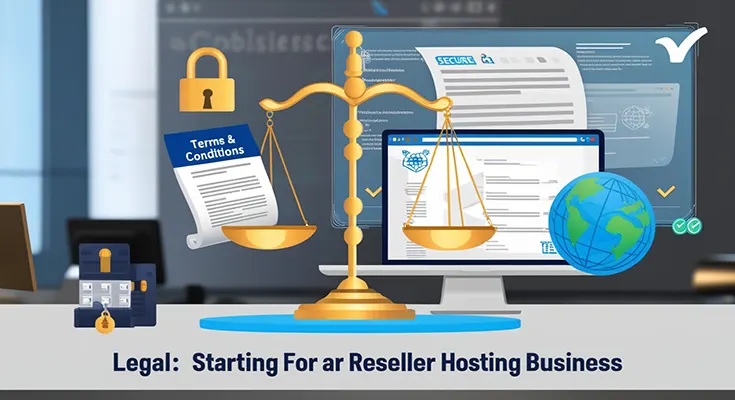Becoming a reseller can be a profitable, exciting and lucrative endeavor. It offers opportunities to build a brand of your own and attract as well as retain clients. When starting your own reseller hosting business, you need to gain a lot of technical expertise and knowledge.
However, it is also important to keep up with the legal aspects of starting a business along with the technical aspects. Even if it is a digital business, it is a financial venture and will carry legal burdens. From data privacy to local laws, you need to comprehend and follow every rule and regulation.
In this guide, we discuss a few of the legal considerations of your reseller hosting business as a web host provider.
Legal Considerations for Starting a Reseller Hosting Business
● Compliance with Industry Standards
Follow local laws and industry standards. If you accept online payments, this may include following PCI-DSS for payment security. It is also important to make sure that you are complying with local and international reseller hosting service standards to protect your business.
● Terms and Conditions (T&Cs)
A well-defined T&Cs agreement is one of the crucial components of a reseller hosting business’s legal considerations. This agreement must cover payment policies, usage policies, refund policies and account termination rules.
The T&C document outlines the rights and duties of both parties, helping prevent any legal or transactional disputes. Make sure that your customer reads all the T&Cs before signing the agreement.
● Service Level Agreements
When you draft a service level agreement (SLA), you create a legal bond with your customer that states the web reselling hosting services you will provide. Drafting a strong SLA is paramount.
It should cover uptime guarantees, support response times and liability limitations. This SLA will protect your business and provide transparency to your customers.
● Data Privacy Regulations
Web reseller hosting often involves handling multiple client information and data. This data is private and sensitive, making privacy and data protection a necessity.
Additionally, data protection laws like GDPR and CCPA help you protect your customer’s data. These laws mandate transparency not only in data collection but also in usage practices.
Start Your Reseller Hosting Business: Useful Tips to Get Started
- Understand the web reseller hosting model. You can purchase bulk hosting resources and create tailored reseller hosting plans to resell them to your clients. This business model has no upfront cost, and you can start small.
- Research the market and choose your niche. Determine the type of website or industry you want to work with. Decide whether you want to cater to small business websites, medical institution sites, educational applications, eCommerce portals, gaming platforms or other streams.
- Choose a reliable reseller hosting service provider. They must offer white-label branding, high uptime, scalability, and 24/7 support. This ensures efficiency, performance, stability, and a good reputation.
- Set up your reseller hosting plans. You can segregate the packages according to their limits, such as basic, standard, premium, and customized. Ensure that you price the reseller hosting plans with a competitive benefit.
- Establish a strong brand identity using white-label branding and consistent visuals.
Conclusion
Starting a reseller hosting business involves more than just technical considerations. There are multiple legal aspects that play a significant role in the formation of your business. From ensuring compliance with data protection laws to drafting clear agreements, being legally prepared is the key to long-term success.





